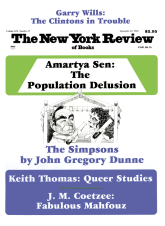To the Editors:
The International Centre for Human Rights and Democratic Development has coordinated a joint letter signed by 14 Nobel Peace Laureates in support of Burmese Laureate Aung San Suu Kyi. The fifth anniversary of Suu Kyi’s arrest was July 20. The letter is part of a world-wide effort to bring attention to Suu Kyi’s continued detention and the efforts to develop democracy in that country.
Carole Samdup
International Centre for Human Rights and Democratic Development
Montreal, Canada
To the State Law and Order Restoration Council of Burma:
For five years Nobel Peace Laureate Aung San Suu Kyi has been held in detention without trial in violation of her fundamental rights. As well, she has been unable to fulfill her mandate as the elected leader of the Burmese people.
We, the undersigned Nobel Peace Laureates, on the occasion of this sad anniversary, wish to once again express our deep concern over her arrest and the denial of her fundamental rights of free speech and political association. We condemn the State Law and Order Restoration Council’s (SLORC) suppression of her rights and those of other political prisoners illegally detained in Burma.
In awarding the Peace Prize in 1991, the Nobel Committee commended Aung San Suu Kyi for her integrity, self-sacrifice, and her consistent and effective practice of the principles of nonviolence in the face of threats to her life and the lives of her followers. The Committee praised her commitment to the primacy of human rights and equality for all of Burma’s peoples.
As fellow Laureates, we too endorse these principles. Several of us were honored last year to reaffirm our admiration for the struggle Aung San Suu Kyi personifies, by participation in a mission to Thailand and Geneva calling for her release. This year, we are encouraged by the solidarity expressed by democratically elected parliamentarians from forty countries who have signed the Global Parliamentary Appeal for Burma, and by the resolution adopted by the General Assembly of United Nations which calls for the involvement of the Secretary-General in the resolution of the crisis that is modern Burma.
In 1988, the SLORC’s predecessors in the military government acquiesced to the requests of the people of Burma to hold democratic elections. As soon as our sister laureate Aung San Suu Kyi became leader of the National League for Democracy, she was jailed for her political activities, ten months prior to the election. Five years have passed. Even according to SLORC’s own draconian laws, Suu Kyi cannot be held any longer than five years without trial. The international community must express its outrage and demand her immediate and unconditional release. The long and unjust incarceration of Aung San Suu Kyi belies the SLORC’s declared intention to allow a transition to civilian rule.
We therefore call on the State Law and Order Restoration Council to free Aung San Suu Kyi and all the Assembly members currently imprisoned, and to begin serious discussion with these and other representative groups with the intention of allowing the constitutional process leading to democracy to begin anew.
As Nobel laureates we applaud Aung San Suu Kyi’s adherence to the principle of nonviolence and human rights. We condemn the cruel treatment she has suffered at the hands of SLORC. She must be set free.
Institute for International Law, 1904
American Friends Service
Committee, 1947
Linus Pauling Institute, 1962
Mrs. Mairead Corrigan Maguire, 1976
Mrs. Betty Williams, 1976
Mr. Adolfo Pérez Esquivel, 1980
President Lech Walesa, 1983
The Most Reverend Archbishop
Desmond Tutu, 1984
International Physicians for the Prevention of Nuclear War, 1985
Dr. Elie Wiesel, 1986
Dr. Oscar Arias, 1987
His Holiness the Dalai Lama, 1989
Mr. Mikhail Gorbachev, 1990
Sra. Rigoberta Menchu, 1992
This Issue
September 22, 1994



